
ENFERMEDADES INFECCIOSAS Y MICROBIOLOGIA CLINICA
Scope & Guideline
Exploring the frontiers of microbial research and clinical practice.
Introduction
Aims and Scopes
- Infectious Disease Epidemiology:
The journal extensively covers the epidemiology of infectious diseases, providing insights into transmission dynamics, outbreak investigations, and the impact of public health interventions, particularly in the Spanish context. - Antimicrobial Stewardship and Resistance:
Research on antimicrobial resistance patterns and stewardship practices is a critical focus, addressing the challenges posed by multidrug-resistant organisms and the development of effective treatment guidelines. - Clinical Microbiology Techniques:
The journal highlights advancements in diagnostic methodologies, including molecular techniques, culture-independent assays, and rapid testing methods, that enhance the detection and management of infectious agents. - Vaccination and Preventive Medicine:
There is a consistent emphasis on vaccination strategies, particularly for vulnerable populations such as those with HIV, children, and the elderly, reflecting the journal's commitment to preventive health measures. - Case Studies and Clinical Reports:
The publication includes a wealth of case studies that illustrate unique presentations of infectious diseases, contributing to clinical knowledge and the understanding of rare or complex cases. - Global and Tropical Medicine:
The journal also addresses global health issues, including tropical diseases and the impact of international travel on local epidemiology, thereby broadening the scope of infectious disease research.
Trending and Emerging
- Impact of COVID-19 on Infectious Disease Management:
Research related to the effects of the COVID-19 pandemic on other infectious diseases, healthcare systems, and patient management strategies is rapidly increasing, highlighting the need for adaptive responses in clinical practice. - HIV and Co-infections:
There is a growing focus on the management of HIV, particularly in relation to co-infections and vaccination strategies, underscoring the complexity of treating immunocompromised patients in a changing epidemiological landscape. - Molecular Epidemiology and Genomic Surveillance:
Emerging themes include the application of genomic techniques in tracking the evolution of pathogens, understanding transmission dynamics, and informing public health responses to outbreaks. - Telemedicine and Digital Health Solutions:
The integration of telemedicine in managing infectious diseases, especially in the context of the pandemic, is a trending area, reflecting a broader shift towards digital health solutions in clinical practice. - Antimicrobial Resistance and Novel Therapeutics:
Research on novel therapeutic approaches to counteract antimicrobial resistance is increasingly prominent, focusing on alternative treatments and the development of new antimicrobial agents.
Declining or Waning
- Traditional Laboratory Techniques:
There has been a noticeable decline in publications focusing on traditional microbiological laboratory techniques, as the field shifts towards more rapid and molecular diagnostics that offer quicker results and higher accuracy. - Specific Pathogen Studies:
Research centered on specific pathogens with previously high publication rates, such as certain bacterial infections, seems to be waning, possibly due to the saturation of existing knowledge and a shift towards broader epidemiological studies. - Non-communicable Disease Intersections:
There appears to be a reduction in studies exploring the intersection of infectious diseases with non-communicable diseases, as the focus narrows more towards acute infectious disease management and prevention.
Similar Journals

Tropical Medicine and Infectious Disease
Connecting researchers to combat infectious threats.Tropical Medicine and Infectious Disease, published by MDPI, is a leading peer-reviewed journal dedicated to advancing the field of tropical medicine and infectious diseases. With an open access model established since 2016, this journal fosters a collaborative environment for researchers, professionals, and students from around the world to disseminate cutting-edge findings and innovative approaches to public health challenges, particularly in tropical regions. The journal has earned recognition, achieving a Q2 quartile ranking in notable fields including Immunology and Microbiology, Infectious Diseases, and Public Health, Environmental, and Occupational Health in 2023, indicative of its influence and relevance in the scientific community. With a focus on high-quality research, Tropical Medicine and Infectious Disease aims to bridge the gap between basic science and clinical application, providing invaluable insights critical for combating infectious diseases and improving health outcomes in vulnerable populations. The journal’s accessibility and substantial indexing in major databases further solidify its importance as a key platform for impactful research in this essential field.
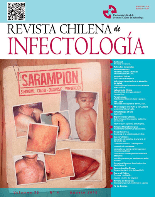
Revista Chilena de Infectologia
Illuminating the path in infectious disease research.Revista Chilena de Infectologia is an esteemed academic journal dedicated to the field of infectious diseases and public health. Published by the SOC CHILENA INFECTOLOGIA, this journal has been pivotal in disseminating crucial research findings since its inception in 2000. While operating under ISSN 0716-1018 and E-ISSN 0717-6341, it aims to contribute to the understanding of both local and global health issues, particularly within the context of Chile. Currently, it holds a Q4 ranking in both the Infectious Diseases and Public Health, Environmental and Occupational Health categories as of 2023, reflecting its unique position among emerging voices in the field. The journal aspires to foster collaboration among researchers, professionals, and students by offering a platform for innovative studies and discussions that address pressing health challenges. Although it is not an Open Access journal, access options through institutional subscriptions are encouraged for a comprehensive review of its significant contributions to infectious disease research.
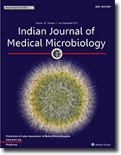
Indian Journal of Medical Microbiology
Connecting Global Scholars in Microbiology and Infectious DiseasesIndian Journal of Medical Microbiology, published by Elsevier, is a pivotal peer-reviewed journal dedicated to the field of medical microbiology, providing a vital platform for research and scholarship since its inception in 1986. With an Open Access model established in 2001, it ensures the dissemination of scientific knowledge to a global audience, enhancing accessibility for researchers, professionals, and students alike. The journal's scope spans critical areas including immunology, infectious diseases, and microbiology, with an impressive trajectory marked by converged years of publication allowing for a comprehensive exploration of evolving scientific trends. As of 2023, the journal holds a Q3 ranking in Infectious Diseases and Microbiology (medical) and a Q4 ranking in Immunology and Microbiology categories, reflecting its significant yet growing impact in the field. Researchers seeking to contribute to or stay updated on the latest advancements in medical microbiology will find the Indian Journal of Medical Microbiology a valuable resource, as it consistently bridges the gap between emerging science and clinical application.

JOURNAL OF INFECTION AND CHEMOTHERAPY
Elevating Standards in Infectious Disease ScholarshipJOURNAL OF INFECTION AND CHEMOTHERAPY, published by Elsevier, is a leading journal in the fields of Infectious Diseases, Microbiology, and Pharmacology. With a solid reputation reflected in its prestigious Q2 ranking in Infectious Diseases and Pharmacology, and Q3 in Microbiology (medical), this journal serves as a vital resource for researchers, clinicians, and students interested in the latest advancements in the diagnosis, treatment, and prevention of infectious diseases. The journal provides a platform for high-quality, peer-reviewed scholarly articles, making it an essential reference point in the medical community. Despite being published without open access, it continues to attract significant scholarly attention, as denoted by its rankings in Scopus, which showcases its impact within the academic landscape. With a timeline converging from 1995 to 2024, JOURNAL OF INFECTION AND CHEMOTHERAPY is dedicated to advancing knowledge and contributing to better health outcomes globally.

Jundishapur Journal of Microbiology
Advancing microbial knowledge for a healthier tomorrow.Welcome to the Jundishapur Journal of Microbiology, a peer-reviewed publication dedicated to advancing the field of microbiology. Published by BRIEFLAND, this journal focuses on key areas such as infectious diseases and medical microbiology, offering a platform for researchers to share their findings from 2009 to 2024. Despite its current positioning in Quartile 4 across various categories in 2023, the journal provides a valuable resource for budding scientists and established professionals alike, contributing to the growing body of knowledge in these critical areas. While it is not an open-access journal, the Jundishapur Journal prioritizes the dissemination of research in the Netherlands, facilitating a deeper understanding of microbial science and its implications for public health. Join a community of innovators committed to exploring both emerging and established themes in microbiology.
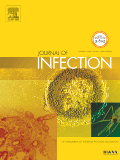
JOURNAL OF INFECTION
Leading the Charge in Infectious Disease ScholarshipJOURNAL OF INFECTION is a premier academic publication in the fields of infectious diseases and medical microbiology, published by W B SAUNDERS CO LTD. With a profound impact factor and established since 1979, this journal serves as a crucial resource for researchers, clinicians, and policy-makers seeking to advance knowledge and understanding of infectious processes and their management. The JOURNAL OF INFECTION holds an impressive position in the academic hierarchy as reflected by its Q1 quartile rankings in both Infectious Diseases and Microbiology (medical) for 2023, further underscored by its Scopus rankings: #2 in Medical Microbiology and #5 in Medical Infectious Diseases, placing it in the 98th percentile overall. While the journal does not offer Open Access options, it provides a comprehensive outlet for innovative research, reviews, and clinical insights that drive the field forward. Published from the United Kingdom, it attracts a global readership keen on staying at the forefront of infectious disease research, making it an essential addition to any academic and clinical library.
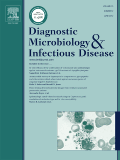
DIAGNOSTIC MICROBIOLOGY AND INFECTIOUS DISEASE
Leading the Charge Against Infectious DiseasesDIAGNOSTIC MICROBIOLOGY AND INFECTIOUS DISEASE, published by Elsevier Science Inc, is a leading journal in the fields of Infectious Diseases, Microbiology, and Medicine. Since its inception in 1983, this esteemed journal has consistently provided a platform for original research and comprehensive reviews that advance the understanding of diagnostic microbiology and its implications for infectious diseases. With an impressive impact factor placing it in the Q2 category in multiple relevant fields as of 2023, it stands out with Scopus rankings reinforcing its significance in academia, ranking #136 out of 344 in Infectious Diseases and #64 out of 140 in Medical Microbiology. This journal is essential for researchers, healthcare professionals, and students who seek to stay abreast of the latest developments and trends in infectious diagnostics. DIAGNOSTIC MICROBIOLOGY AND INFECTIOUS DISEASE is committed to fostering excellence in research quality and academic rigor, ensuring accessibility to vital knowledge for addressing some of the most pressing health challenges of our time.

Reviews and Research in Medical Microbiology
Pioneering Insights into Pathogens and HealthReviews and Research in Medical Microbiology is a premier academic journal published by LIPPINCOTT WILLIAMS & WILKINS, focusing on groundbreaking research and comprehensive reviews that advance the understanding of medical microbiology. With an ISSN of 2770-3150 and an E-ISSN of 2770-3169, this journal serves as an essential resource for researchers, healthcare professionals, and students dedicated to the study of pathogens, infectious diseases, and microbial mechanisms affecting health. While the journal currently does not offer open access, its rigorous peer-review process ensures that only high-quality, impactful research is disseminated to the scientific community. The journal aims to bridge gaps in knowledge by presenting cutting-edge studies that explore novel therapeutic strategies, diagnostic methods, and the evolving landscape of microbial resistance. Nestled in the heart of Philadelphia, this journal proudly contributes to the advancement of medical microbiology and is an indispensable platform for the publication of critical findings that shape clinical practices and research trajectories in the field.

GERMS
Exploring the frontiers of infectious disease knowledge.GERMS is a multidisciplinary journal published by the EUROPEAN ACAD HIV-AIDS & INFECTIOUS DISEASES, dedicated to advancing knowledge in the fields of epidemiology, immunology, infectious diseases, and microbiology. Since its inception in 2011, the journal has provided a crucial platform for researchers and practitioners to share innovative studies, clinical findings, and public health insights, with an eye on improving health outcomes globally. With an ISSN of 2248-2997 and a consistent publication trajectory leading up to 2024, GERMS is recognized in the third quartile across several categories, reflecting its growing impact and relevance in the scientific community. Authors and readers benefit from a range of access options, fostering the dissemination of vital research findings. As a journal situated in Romania, it also addresses regional health challenges while contributing to the broader discourse on infectious diseases and public health. GERMS is not just a repository of knowledge, but a vital resource for those engaged in combating infectious diseases and promoting health equity.
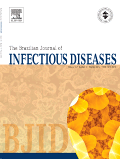
Brazilian Journal of Infectious Diseases
Transforming clinical practice with cutting-edge studies.The Brazilian Journal of Infectious Diseases, published by Elsevier Brazil, is a premier open-access journal dedicated to advancing research and clinical practice in the field of infectious diseases. Since its inception in 2001, this journal has been pivotal in disseminating innovative studies and reviews that inform healthcare professionals and researchers alike. With an impressive impact factor reflected by its ranking in the second quartile for Infectious Diseases and third quartile for Medical Microbiology in 2023, the journal ranks #127 out of 344 in medicine – infectious diseases and #61 out of 140 in medical microbiology, showcasing its reputable standing in the scientific community. The Brazilian Journal of Infectious Diseases invites contributions that highlight significant findings, novel methodologies, and critical reviews aimed at enhancing patient care and public health initiatives. With an international readership and a focus on pressing issues in infectious diseases, it serves as an essential platform for knowledge exchange and collaboration among scholars and practitioners across Brazil and beyond. By reinforcing the importance of open access to scientific literature, this journal not only promotes transparency but also enhances the global discourse surrounding infectious diseases.